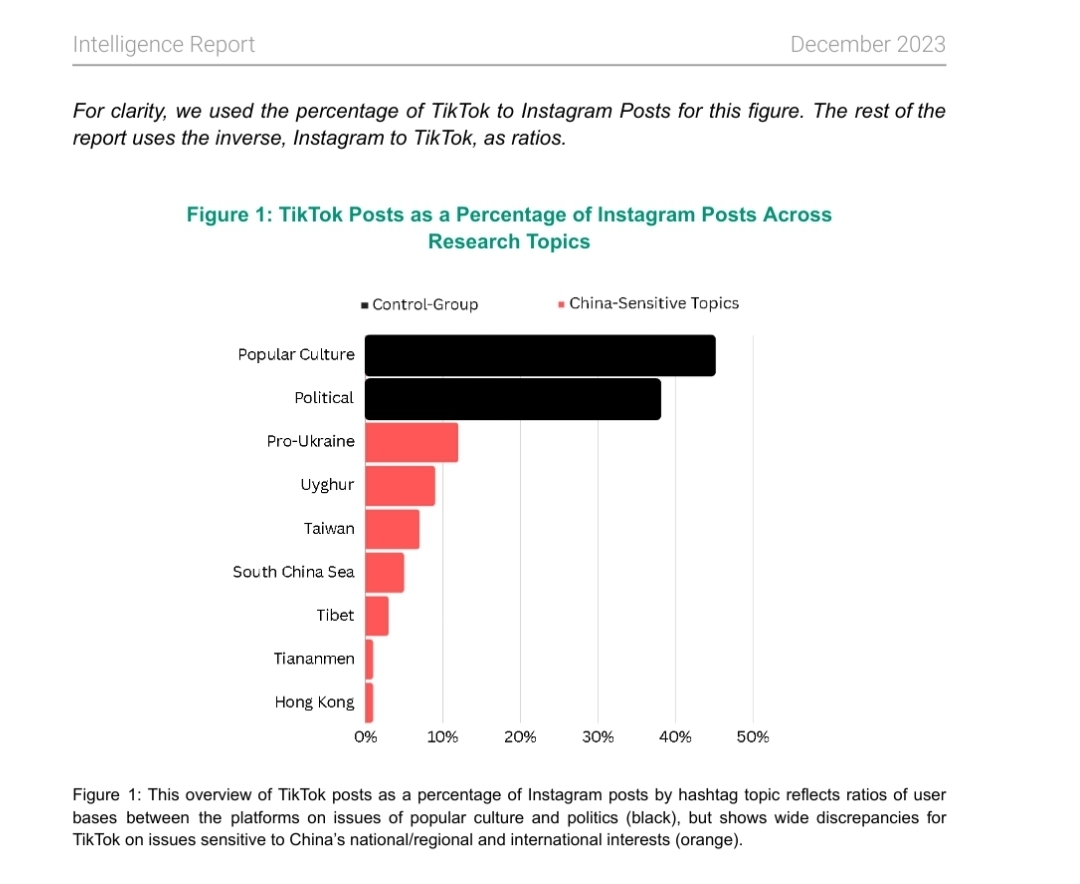- cross-posted to:
- politics@lemmy.world
- usnews@beehaw.org
- cross-posted to:
- politics@lemmy.world
- usnews@beehaw.org
The times dives into an intelligence report on how TikTok’s political algorithm anomalies align with the CCP’s Geostrategic Objectives https://networkcontagion.us/wp-content/uploads/A-Tik-Tok-ing-Timebomb_12.21.23.pdf
This report highlights major differences in the prevalence of hashtags related to subjects like Hong Kong Protests, Tainanmen Square, Tibet, the South China Sea, Taiwan, Uyghurs, Pro-Ukraine, and Pro-Isreal when compared to other major social media platforms.
Additionally the times cited a Wall Street Journal analysis (https://www.wsj.com/tech/tiktok-israel-gaza-hamas-war-a5dfa0ee) which “found evidence that TikTok was promoting extreme content, especially against Israel. (China has generally sided with Hamas.)”
Here’s a figure from the actual research the articles are describing and linked inside:

https://networkcontagion.us/wp-content/uploads/A-Tik-Tok-ing-Timebomb_12.21.23.pdf
This is based on methodology TikTok itself suggested be done, comparing posts on TikTok to Instagram.
As someone who has been neutral on the whole TikTok sale/ban issue, this is the most damning thing I’ve seen.
And I am not defending Israel here but I wonder if TikTok’s promotion of anti-Israel content is part of why young people have been so visible in demonstrating against Israel.
And I am not defending Israel here but I wonder if TikTok’s promotion of anti-Israel content is part of why young people have been so visible in demonstrating against Israel.
I’ve been seriously wondering this since this morning as well/I’m in a similar position.
I think you missed a crucial bit of info that makes this graph make more sense: “Normal ratios, given Instagram’s larger user base”. Which explains why the control groups are the way they are.
Thanks for posting this. I admit I’m of the opinion that this kind of evidence is moot because even the potential for a foreign adversary to have this kind of public manipulation and intelligence gathering tool in place is an unacceptable risk. But it’s good to see people taking the time to dig into the data to make an even clearer case.
And the chorus goes: “But whatabout Facebook!”
And the chorus goes: “But whatabout Facebook!”
Amusingly the crowd that seems to care the most about this TikTok situation is generally the same crowd that supports government controlled censorship of US based Social Media like Facebook!
The cognitive dissonance between “TikTok should be free to do whatever it wants!” and “Facebook / Twitter / Insta / Snap need to suppress things I don’t agree with.” is amazing.
That’s not what I see at all.
Normally it goes more like instead of targeting TikTok specifically, we should pass a broad bill that targets all social media companies regardless of who owns them.
The point isn’t generally that TikTok should be free or Facebook et al need to suppress but that we should treat all of their problematic behavior in the same way.
…but that we should treat all of their problematic behavior in the same way.
That’s the part I’m referring too. In this context “Problematic behavior” refers to “Allows opinions I disagree with / doesn’t allow opinions I do agree with.” and the only fix for that is censorship of the domestic platforms while allowing TikTok to continue doing whatever it wants.
I believe the “problematic behavior” you’re referring to is the collection and sale of user data but that isn’t what the provided research or my comment were about.
Isn’t the solution you’re implying (and the solution pushed for by OP) if I’m not misunderstanding the exact mirror image? I.e. we should disallow TikTok from platforming opinions you disagree with (aligns with China) while allowing Facebook et al to continue because they mainly show opinions you happen to agree with (aligns with Western interests)?
I think the main opinion I see on Lemmy is that we should either force them all to regulate speech the same way, or not regulate free speech on any of them, but either way with a clear rule that is applied fairly and equally.
Isn’t the solution you’re implying (and the solution pushed for by OP) if I’m not misunderstanding the exact mirror image? I.e. we should disallow TikTok from platforming opinions you disagree with (aligns with China) while allowing Facebook et al to continue because they mainly show opinions you happen to agree with (aligns with Western interests)?
There’s a significant difference between platforming an opinion and secretly boosting friendly content while suppressing contrary content. ByteDance has apparently been lying to everyone’s face because they claimed they WEREN’T adjusting content like this when it turns out they are. That isn’t platforming it’s manipulation.
Then there’s the idea that “aligns with China” is somehow equivalent to “aligns with Western interests” when the former represents a single political party in a single country (CCP) while the latter represents literally dozens of nations with hundreds of political parties that are loosely coalesced around a very generalized idea of Liberalism. The West simply doesn’t have a singular opinion or interest on anything.
For example I can hop on Twitter or Insta or Lemmy and get everything from “Israel is da’ bestest!” to “Israel is a monster committing genocide.” and even though its diametrically opposed it can still be considered “Western Interest”. Meanwhile over in TikTok land, at least according to the study, the exact opposite is happening. There’s one correct opinion, the CCPs, and if content doesn’t align with it then it gets pushed down.
I think the main opinion I see on Lemmy is that we should either force them all to regulate speech the same way, or not regulate free speech on any of them, but either way with a clear rule that is applied fairly and equally.
A lot of people will claim that right up until they run into content they feel strongly about and then they’ll call to have it boosted or censored, whichever aligns with their opinion. We’ve watched it play out over and over and over in Social Media the last few years.
In the end ByteDance / TikTok is a new and unique problem for the United States; for the first time ever we are being challenged by a tech platform from a rival nation that has vastly different policy goals and ideas about society and social management that are incompatible with our own.
I largely agree, but when I got the email from the times this morning I went “Why aren’t you guys posting this front page!? People need to know about this research. This isn’t just a hypothetical risk anymore!”
I would worry about this more if the American social media networks didn’t have a pro-corporate tilt.
I think there’s a pretty strong argument that a pro-corporate tilt doesn’t result in a difference in content promotion regarding Tibet, Tiananmen Square, Hong Kong, and/or Uyghur.
You could argue the US military industrial complex might push South China Sea, pro-Taiwan, pro-Ukraine, and pro-Isreal content; that seems distant enough from (e.g.) Facebook, but I’m not sure how we’d tell. We don’t have a major social media platform in a place like (e.g.) Switzerland to study (granted, the way Proton is expanding they might try).
In any case, I do think it’s pretty damning for TikTok’s claims of independence that China’s direct conflicts, Tiananmen Square and Hong Kong are basically suppressed to the point of being nil (EDIT: Tibet is also a direct conflict of sorts but isn’t talked about as much from what I’ve seen on “western social media” and could be conditionally filtered … there’s still probably a fair bit of “Tibet” content that exists outside of the “bad for the CCP” space).
I think there’s a pretty strong argument that a pro-corporate tilt doesn’t result in a difference in content promotion regarding Tibet, Tiananmen Square, Hong Kong, and/or Uyghur.
How about a difference in content promotion regarding Israel? You know, the country the MiC makes a huge amount of money supporting?
Read past the first paragraph…
I did. My apologies, I saw pro-Taiwan, but somehow missed the pro-Israel next to it.
Okay, then yeah; I think we’re in agreement more research would be needed (and difficult!).
I can’t dissuade or dismiss your point … but I am personally less convinced there is a correlation.
We also need to take into account how addressable the problems are in the current climate. To tackle pro-corporate biases, we’re looking at a long quest that runs counter to the underlying fabric of our society. It’s a fundamentally anti-capitalist proposition and we live in a capitalist society.
This issue with a foreign power is much smaller, and thus easier to crack. It’s much less far-reaching, it’s less important. But it should still lead to small gains in the improvement of the information sphere.
I just hope that the result of forcing the sale of tiktok doesn’t result in Facebook owning it
There’s a good chance the (current) FTC wouldn’t let that happen.
I could see Microsoft or possibly Apple taking an interest. They’re big players without a social media platform, that have the cash to buy and run one.
I find it telling that just days after this report was released TikTok changed their UI so that doing this kind of research is potentially impossible.
- surprised Pikachu! -
So they found less propaganda on TikTok. Good to know!
Downvoted by .ml/hexbear trolls








